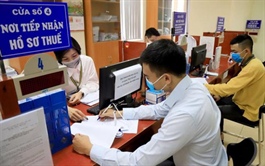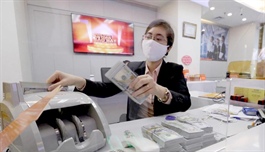Expanded credit probable for January
Expanded credit probable for January
The State Bank of Vietnam (SBV) will likely provide commercial banks with more credit room in January, according to economists.

To inject additional money into the economy, banks are also awaiting the SBV's revision of some risk-reward laws.
The market heard speculation last week that the SBV will provide commercial banks with a credit line in January. Consequently, banks will be awarded a credit margin ranging from 10 to 12 per cent, depending on the bank.
The credit rating of the whole system climbed by 14.5 per cent in 2022, the biggest rise over the previous five years. Dr. Le Xuan Nghia, an economic expert, said that in 2023, the SBV may consider boosting the money supply to help the economy owing to lessened external pressure and a higher inflation goal (4.5 per cent). As a result of the large base in 2022, economists anticipate that credit growth will decrease in 2023, expanding by 12 to 13 per cent.
In addition to the credit room, many banks anticipate that the SBV will alter Circular 22/2019/TT-SBV to change the restrictions on limits and safety ratios in a more market-appropriate manner. It is anticipated that the loan-to-deposit ratio will increase from 85 to 90 releasing a substantial amount of money for the economy.
Chairman of VietinBank's Board of Directors Tran Minh Binh stated that the initial announcement of the credit room by SBV and the issuance of a document amending Circular 22 were highly beneficial for banks to balance capital, allowing them to take the lead in capital sources and credit growth from the start of the year.
Pham Quang Dung, chairman of Vietcombank's Board of Directors, suggested that SBV consider enabling state-owned commercial banks to be proactive in their yearly loan growth scale based on following rules on limitations, safety ratio in operation, and national and international standards. The elimination of credit space for the Big Four will have no effect on the management of the SBV since the level of charter capital restricts state-owned commercial banks.
Prior to this, the Vietnam Banks Association requested that the SBV assign credit objectives from the start of the year so that credit institutions may construct business strategies through the annual shareholder meeting in April.
Credit management constrained
In 2022, the bond and securities market struggled, and the disbursement of state investment was delayed, placing a significant strain on bank credit.
Pham Thanh Ha, deputy governor of the SBV, is concerned that the economy's medium- and long-term investment capital rests mostly on the banking system, yet the bank's capital mobilisation is primarily short-term, so exposing the credit institution system to liquidity and term risks.
"To secure resources for economic growth, it is vital to create capital markets, such as the corporate bond market and the stock market, in a safe and long-term way. Thus, it is vital to reassess the existing laws and come up with ways to address the present deficiencies in these marketplaces," Ha said.
In the meantime, the director of the SBV's Monetary Policy Department, Pham Chi Quang, cautioned that Vietnam's leverage ratio was very high (Vietnam's credit-to-GDP ratio is 124 per cent, the highest level among nations with a medium-low average income, according to World Bank figures).
"The overall credit balance of the banking sector is nearing $512 million, which is a staggering amount. Consequently, there is extremely little room for credit management in the aforesaid situation," Quang said.
Pham Chi Quang, director of monetary policy (SBV)
Vietnam's economy relies heavily on bank credit, so in the context of complex, unexpected fluctuations in the stock market, corporate bonds, and real estate market, with signs of contraction, there has been increased pressure on bank credit balances and monetary policy management in 2022 and beyond. In addition, the sluggish dispersion of public investment raises the strain on the economy's bank credit supply of capital.
With this distinction, the SBV's operational orientation in 2023 will be, in addition to supporting the process of economic growth and recovery, to conduct monetary policy to maintain the stability of the currency and manage inflation. One of the primary objectives of the banking sector has been to preserve the integrity, stability, and sustainability of the credit institution system.
According to SBV leaders, there are a variety of resources for socioeconomic growth, including credit capital, the enterprise's own capital, capital from the stock market, corporate bonds, public investment capital, foreign direct investment capital, and remittance.
It is vital to simultaneously open, link, and grow all of these funding sources. Bank credit is seen as the centre, the artery that connects capital sources. However, since the economy depends excessively on credit and inflationary pressure is high, monetary policy cannot be arbitrary.
In the newly released Resolution 01/NQ-CP, the government states that stable, safe, and sustainable growth of the money, credit, corporate bond, and securities markets will be a top priority in 2023.
Dr. Can Van Luc, an economist, advises businesses in particular to reorganise and regulate cash flow risks, diversify sources of capital mobilisation, and actively investigate and approach the socioeconomic development and recovery programme.
























